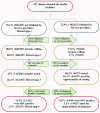Missed opportunities for earlier HIV testing and diagnosis at the health facilities of Dessie town, North East Ethiopia
- PMID: 20573215
- PMCID: PMC2903520
- DOI: 10.1186/1471-2458-10-362
Missed opportunities for earlier HIV testing and diagnosis at the health facilities of Dessie town, North East Ethiopia
Abstract
Background: For patients in all health-care settings HIV screening is recommended after the patient is notified that testing will be performed unless the patient declines. The nation's physicians and other health care providers should assume a much more active role in promoting HIV testing. The aim of this study was to investigate the extent to which missed opportunities for earlier HIV testing and diagnosis occur in the health facilities of north east Ethiopia.
Methods: A confidential client exit interview and medical record review was made on 427 clients who attended health facilities of Dessie town between November-December 2008. Data collection was done by counselors trained on Provider Initiated Counseling and Testing (PICT) and data collection tool included demographics, reason for visit to health facilities, HIV test initiation by service providers, clients self risk perception, clients willingness and acceptance of HIV test, HIV test result and review of client medical records.
Results: Among 427 clients, missed opportunities for HIV testing were found in 76.1% (325) of clients. HIV test initiation was made by data collecting counselors during interview period and 80.0% (260) of clients not initiated by service providers were found to be willing to have HIV test. Large number, 43.0% (112), of the willing clients actually tested for HIV. Of the tested clients, 13.4% (15) were found to be HIV positive. Most, 60% (9), of HIV positive clients who lost the opportunities of diagnosis felt themselves as having no risk for HIV infection. Missed opportunities for HIV diagnosis of 51.7% (15), overall HIV test acceptance rate of 36.5% (154) and positivity rate of 6.9% (29) were found.
Conclusions: The missed opportunities for earlier HIV test and diagnosis of patients attending health facilities were found to be high and frequent. Testing only clients with HIV risk misses large number of HIV positive patients. Asking clients' willingness for HIV testing should be conducted by all service providers irrespective of the clients' risk behaviors for HIV infection or the type of services they need.
Figures
References
-
- Implementing the UN learning strategy on HIV/AIDS. Sixteen Case Studies. 2007. UNAIDS.UNAIDS/07.08E/JC1311E.
-
- AIDS epidemic update: December 2006/Global Summery. http://www.measuredhs.com/ Accessed on August 10/2008.
-
- Single point HIV prevalence estimate. MOH Ethiopia. 2007.
MeSH terms
LinkOut - more resources
Full Text Sources
Medical


